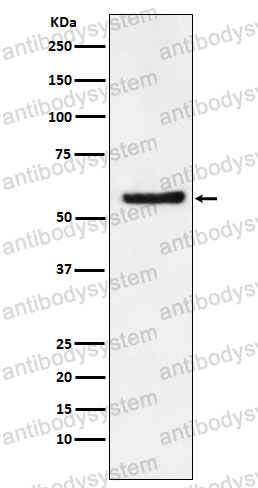Catalog No.
RHB02002
Species reactivity
Human, Mouse, Rat
Host species
Rabbit
Isotype
IgG
Clonality
Monoclonal
Tested applications
IF: 1:50-1:200, IHC: 1:100-1:200, WB: 1:1000-1:2000
Target
CBF5 homolog, Nucleolar protein NAP57, NOLA4, H/ACA ribonucleoprotein complex subunit DKC1, snoRNP protein DKC1, Nucleolar protein family A member 4, Nopp140-associated protein of 57 kDa, Dyskerin, DKC1
Concentration
1 mg/ml
Endotoxin level
Please contact with the lab for this information.
Purity
>95% by SDS-PAGE.
Purification
Protein A/G purified from cell culture supernatant.
Accession
O60832
Applications
IF, IHC, WB
Form
Liquid
Storage buffer
0.01M PBS, pH 7.4, 0.05% BSA, 50% Glycerol, 0.05% Sodium azide.
Stability and Storage
Use a manual defrost freezer and avoid repeated freeze thaw cycles. Store at 4 ℃ for frequent use. Store at -20 ℃ for twelve months from the date of receipt.
Clone ID
R1E88
Haploidentical Hematopoietic Cell Transplantation in Dyskeratosis Congenita with Myelodysplastic Syndrome/Acute Myeloid Leukemia., PMID:40061174
Identification of new telomere- and telomerase-associated autoantigens in systemic sclerosis., PMID:36634459
Predictive value of pseudouridine in prostate cancer., PMID:31511832
[A Case of Stage ⅣRectal Cancer with Dyskeratosis Congenita]., PMID:30914599
In silico screening of proteins targeting circulating miRNAs for improved diagnosis of multiple myeloma., PMID:29448111
Native gel electrophoresis of human telomerase distinguishes active complexes with or without dyskerin., PMID:22187156
Chromosomal and telomeric reprogramming following ES-somatic cell fusion., PMID:19904548
Analysis of epitope-tagged forms of the dyskeratosis congenital protein (dyskerin): identification of a nuclear localization signal., PMID:10744426
Dyskerin localizes to the nucleolus and its mislocalization is unlikely to play a role in the pathogenesis of dyskeratosis congenita., PMID:10556300

